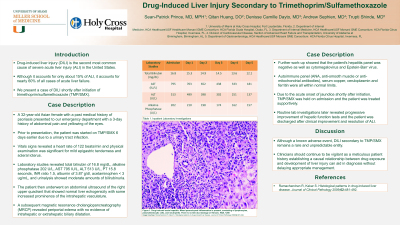Sunday Poster Session
Category: Liver
P1096 - Drug-Induced Liver Injury Secondary to Trimethoprim/Sulfamethoxazole
Sunday, October 22, 2023
3:30 PM - 7:00 PM PT
Location: Exhibit Hall

Has Audio

Sean-Patrick A. Prince, MD, MPH
University of Miami/Holy Cross Hospital
Pompano Beach, FL
Presenting Author(s)
Sean-Patrick Prince, MD, MPH1, Qitan Huang, DO2, Denisse Camille Dayto, MD2, Andrew Sephien, MD2, Trupti Shinde, MD2
1University of Miami/Holy Cross Hospital, Pompano Beach, FL; 2HCA Healthcare/USF Morsani GME Consortium: HCA Florida Citrus Hospital, Inverness, FL
Introduction:
Drug-induced liver injury (DILI) is the second most common cause of severe acute liver injury (ALI) in the United States, second only to ischemic hepatitis. Although it accounts for only about 15% of ALI, it is known to have the worst prognosis compared to all other causes; for nearly 60% of all cases of acute liver failure. We present a case of DILI shortly after initiation of trimethoprim/sulfamethoxazole (TMP/SMX).
Case Description/Methods:
A 32-year-old Asian female with a past medical history of psoriasis presented to our emergency department with a 3-day history of abdominal pain and yellowing of the eyes. Prior to presentation, the patient was diagnosed with a urinary tract infection 6 days earlier and started on TMP/SMX. Vitals signs were significant for a heart rate of 122 beats/min. Physical examination revealed mild epigastric tenderness and significant scleral icterus. Laboratory investigations found total bilirubin of 16.8 mg/dL, alkaline phosphatase 202 U/L, AST 795 IU/L, ALT 513 U/L, PT 15.8 seconds, INR ratio 1.5, albumin of 3.87 g/dl, acetaminophen < 3 ug/mL, and urinalysis showed moderate amounts of bilirubinuria.
The patient then underwent an abdominal ultrasound of the right upper quadrant that showed normal liver echogenicity with some increased prominence of the intrahepatic vasculature. A subsequent magnetic resonance cholangiopancreatography (MRCP) revealed periportal edema with no evidence of intrahepatic or extrahepatic biliary dilatation. Further work-up showed that the patient's hepatitis panel was negative as well as cytomegalovirus and Epstein-Barr virus. Autoimmune panel (ANA, anti-smooth muscle or anti-mitochondrial antibodies), serum copper, ceruloplasmin and ferritin were all
within normal limits. Due to the acute onset of jaundice shortly after initiation, TMP/SMX was held on admission and the patient was treated supportively. Routine lab investigations later revealed progressive improvement of hepatic function tests and the patient was discharged after clinical improvement and resolution of ALI.
Discussion:
Although a known adverse event, DILI secondary to TMP/SMX remains a rare and unpredictable entity. With clinical presentations ranging from mild jaundice to fulminant hepatic failure, it is an important differential to always consider. Clinicians should continue to be vigilant as a meticulous patient history establishing a causal relationship between drug exposure and development of liver injury can aid in diagnosis without delaying appropriate management.
Disclosures:
Sean-Patrick Prince, MD, MPH1, Qitan Huang, DO2, Denisse Camille Dayto, MD2, Andrew Sephien, MD2, Trupti Shinde, MD2. P1096 - Drug-Induced Liver Injury Secondary to Trimethoprim/Sulfamethoxazole, ACG 2023 Annual Scientific Meeting Abstracts. Vancouver, BC, Canada: American College of Gastroenterology.
1University of Miami/Holy Cross Hospital, Pompano Beach, FL; 2HCA Healthcare/USF Morsani GME Consortium: HCA Florida Citrus Hospital, Inverness, FL
Introduction:
Drug-induced liver injury (DILI) is the second most common cause of severe acute liver injury (ALI) in the United States, second only to ischemic hepatitis. Although it accounts for only about 15% of ALI, it is known to have the worst prognosis compared to all other causes; for nearly 60% of all cases of acute liver failure. We present a case of DILI shortly after initiation of trimethoprim/sulfamethoxazole (TMP/SMX).
Case Description/Methods:
A 32-year-old Asian female with a past medical history of psoriasis presented to our emergency department with a 3-day history of abdominal pain and yellowing of the eyes. Prior to presentation, the patient was diagnosed with a urinary tract infection 6 days earlier and started on TMP/SMX. Vitals signs were significant for a heart rate of 122 beats/min. Physical examination revealed mild epigastric tenderness and significant scleral icterus. Laboratory investigations found total bilirubin of 16.8 mg/dL, alkaline phosphatase 202 U/L, AST 795 IU/L, ALT 513 U/L, PT 15.8 seconds, INR ratio 1.5, albumin of 3.87 g/dl, acetaminophen < 3 ug/mL, and urinalysis showed moderate amounts of bilirubinuria.
The patient then underwent an abdominal ultrasound of the right upper quadrant that showed normal liver echogenicity with some increased prominence of the intrahepatic vasculature. A subsequent magnetic resonance cholangiopancreatography (MRCP) revealed periportal edema with no evidence of intrahepatic or extrahepatic biliary dilatation. Further work-up showed that the patient's hepatitis panel was negative as well as cytomegalovirus and Epstein-Barr virus. Autoimmune panel (ANA, anti-smooth muscle or anti-mitochondrial antibodies), serum copper, ceruloplasmin and ferritin were all
within normal limits. Due to the acute onset of jaundice shortly after initiation, TMP/SMX was held on admission and the patient was treated supportively. Routine lab investigations later revealed progressive improvement of hepatic function tests and the patient was discharged after clinical improvement and resolution of ALI.
Discussion:
Although a known adverse event, DILI secondary to TMP/SMX remains a rare and unpredictable entity. With clinical presentations ranging from mild jaundice to fulminant hepatic failure, it is an important differential to always consider. Clinicians should continue to be vigilant as a meticulous patient history establishing a causal relationship between drug exposure and development of liver injury can aid in diagnosis without delaying appropriate management.
Disclosures:
Sean-Patrick Prince indicated no relevant financial relationships.
Qitan Huang indicated no relevant financial relationships.
Denisse Camille Dayto indicated no relevant financial relationships.
Andrew Sephien indicated no relevant financial relationships.
Trupti Shinde indicated no relevant financial relationships.
Sean-Patrick Prince, MD, MPH1, Qitan Huang, DO2, Denisse Camille Dayto, MD2, Andrew Sephien, MD2, Trupti Shinde, MD2. P1096 - Drug-Induced Liver Injury Secondary to Trimethoprim/Sulfamethoxazole, ACG 2023 Annual Scientific Meeting Abstracts. Vancouver, BC, Canada: American College of Gastroenterology.
